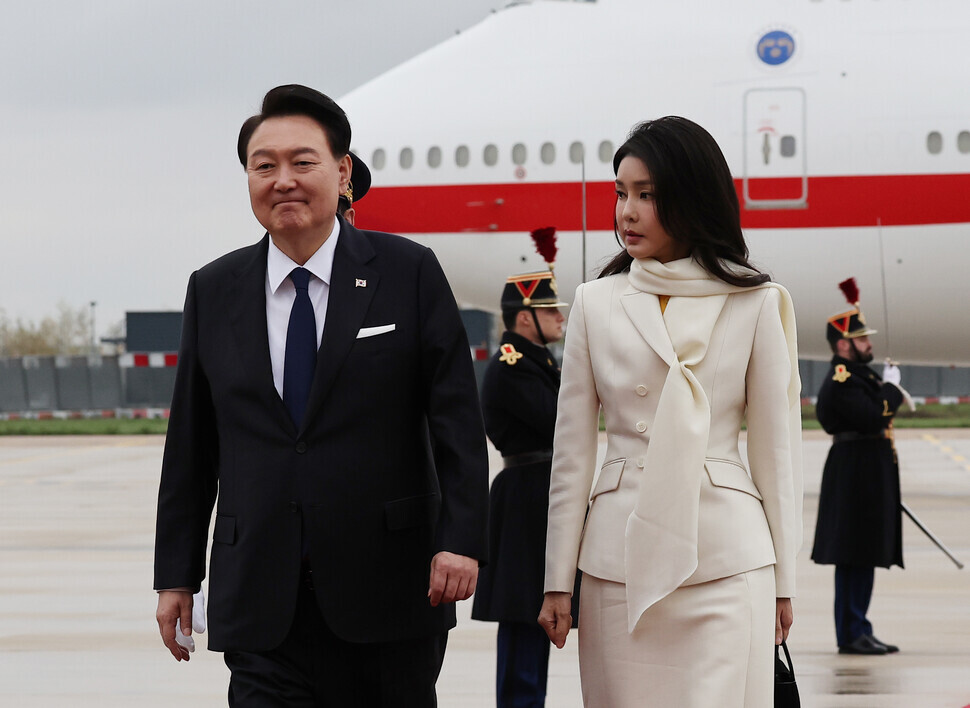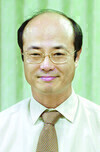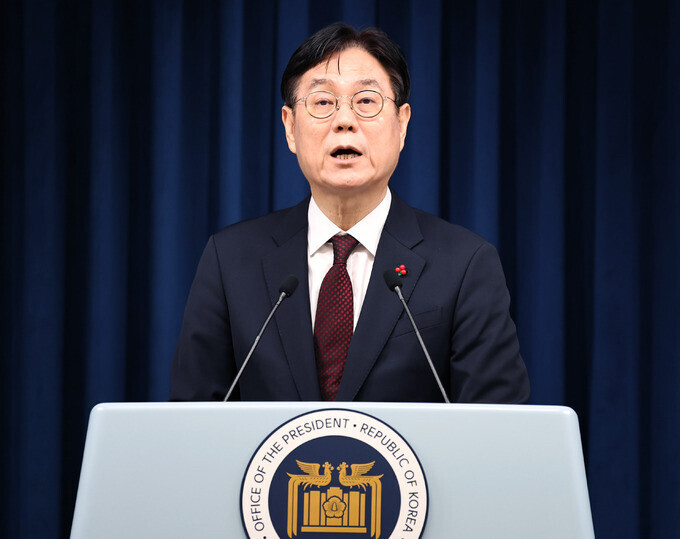hankyoreh
Links to other country sites 다른 나라 사이트 링크
[Column] Is South Korea’s president afraid of his wife?


By Seong Han-yong, senior political writer
Shortly after National Assembly votes were held on legislation for special prosecutors to investigate first lady Kim Keon-hee and the so-called “Daejang 5 billion won club” on the afternoon of Dec. 28 last year, senior presidential security for public relations Lee Do-woon appeared at the podium in the briefing room.
Appearing slightly flushed, he said, “The two special prosecutor bills have now been passed by the National Assembly. The president will be exercising his veto powers immediately upon their passage to the administration.”
The Constitution of the Republic of Korea states that once legislation has been approved by the National Assembly, a president who objects to it can send it back with a statement of objections and request renewed discussions. That is the authority that the president possesses: to “request reconsideration.”
The term “veto” is sometimes used by the press as a matter of convenience. Public officials themselves do not often use the word.
Yet here was Lee Do-woon, the senior public relations secretary, using a term that is contrary to the Constitution and law. He may have been using it deliberately to underscore the president’s opposition.
Lee was born in 1964 in Hongcheon, Gangwon Province. He graduated from Osan High School and studied political science and diplomacy at Yonsei University before going to work as a reporter at the Seoul Shinmun, a daily paper.
He served as a spokesperson for former UN Secretary-General Ban Ki-moon in 2007 before heading to the Munhwa Ilbo newspaper as an editorial writer. He was appointed as a spokesperson for President Yoon Suk-yeol in February 2023 and became senior presidential secretary for public relations in November.
Shortly after the matter of exercising reconsideration request powers for the special prosecutor legislation was discussed at an extraordinary Cabinet meeting on Friday, Yoon’s chief of staff, Lee Kwan-sup, came forward to explain point-by-point what was “wrong” with the bills in question.
Some of what he said was correct, but more of it was inaccurate. The argument that the bill to assign a special prosecutor for the “5 billion won club” was intended to “shield” Democratic Party leader Lee Jae-myung was pure sophistry.
Regarding the alleged Deutsch Motors stock manipulation special prosecutor bill, he insisted, “This concerns matters from 12 years ago, before [Kim and Yoon] got married, and constitutes a double investigation of an incident that was exhaustively examined for two years under the Moon Jae-in administration, only to not result in even a summons, let alone an indictment.” He went on to call it a “violation of the human rights of individuals who have already been tried.”
If this is accurate, it would suffice for the prosecutors to decide not to press charges against Kim Keon-hee. It isn’t that the prosecutors have not been able to summon Kim to date — they have chosen not to. The prosecutors’ failure to properly investigate is the very reason a special prosecutor is needed.

Born in 1961, Lee Kwan-sup is an experienced career bureaucrat who graduated from Kyeongbuk High School and studied business administration at Seoul National University before going to work at the Ministry of Trade, Industry and Energy. Under the Yoon administration, he was appointed as senior presidential secretary for policy planning and state affairs coordination.
As word spread that he was a heavyweight in the presidential office, he was appointed last November as policy office chief. A month later, he became Yoon’s chief of staff. It’s quite awkward to see a former economic official giving political briefings.
On Friday, the Ministry of Justice issued a six-page press release entitled “National Assembly reconsideration request and Cabinet vote on two unconstitutional special prosecutor bills unilaterally forced through by opposition parties.”
In it, the ministry wrote, “These bills, which were fast-tracked unilaterally by a majority opposition party ahead of a general election and without bipartisan discussion, represent political legislation meant to influence the election.” It might as well have been a commentary from a People Power Party spokesperson.
The minister of justice is the figure with supreme oversight authority over prosecutorial affairs. Ordinarily, it is a Cabinet position that involves directing and monitoring the prosecutors; in concrete cases, they direct and oversee the prosecutor general alone.
By issuing this press release, the ministry may have violated the Prosecutors’ Office Act obligation for prosecutors to remain politically neutral. Why on earth was it issued, and on whose orders? The seat of minister of justice is currently vacant, with Vice Minister Lee Noh-kong serving as acting minister.
Born in 1969 in Incheon, Lee Noh-kong graduated from Youngnak High School and studied law at Yonsei University before becoming a prosecutor. He is known to be quite close to Yoon Suk-yeol, whom he carpooled with while working at the Seongnam branch of the Suwon District Prosecutors’ Office.
Shortly after Busan failed in its bid to hold the World Expo, Yoon issued a personal apology.
“As the president, I oversaw and assumed responsibility for the expo bid, and I am sincerely sorry for disappointing the people of Busan and South Korea,” he said at the time, asking the public to “consider all of this to be my own failing.”
“The failure to effectively direct the process and win the bid was due to my own inadequacy as president,” he added.
But when the matter turns to the allegations surrounding Kim Keon-hee, Yoon is tight-lipped. He holds subordinates out as shields against the public’s criticism, while hiding cravenly behind them.
Why should this be? Is he scared of Kim Keon-hee? Can he not hear all the media insisting that the issues surrounding the first lady are matters that cannot simply be overlooked?
Could it be that there’s not a single person in the presidential office or ruling party who has advised the president that the allegations surrounding the first lady be dealt with according to the law?
It makes one wonder if all his subjects are disloyal.
Please direct questions or comments to [english@hani.co.kr]

Editorial・opinion
![[Editorial] Exploiting foreign domestic workers won’t solve Korea’s birth rate problem [Editorial] Exploiting foreign domestic workers won’t solve Korea’s birth rate problem](https://flexible.img.hani.co.kr/flexible/normal/500/300/imgdb/original/2024/0626/5517193887628759.jpg) [Editorial] Exploiting foreign domestic workers won’t solve Korea’s birth rate problem
[Editorial] Exploiting foreign domestic workers won’t solve Korea’s birth rate problem![[Column] Kim and Putin’s new world order [Column] Kim and Putin’s new world order](https://flexible.img.hani.co.kr/flexible/normal/500/300/imgdb/original/2024/0625/9617193034806503.jpg) [Column] Kim and Putin’s new world order
[Column] Kim and Putin’s new world order- [Editorial] Workplace hazards can be prevented — why weren’t they this time?
- [Editorial] Seoul failed to use diplomacy with Moscow — now it’s resorting to threats
- [Column] Balloons, drones, wiretapping… Yongsan’s got it all!
- [Editorial] It’s time for us all to rethink our approach to North Korea
- [Column] Why empty gestures matter more than ever
- [Editorial] Seoul’s part in N. Korea, Russia upgrading ties to a ‘strategic partnership’
- [Column] The tragedy of Korea’s perpetually self-sabotaging diplomacy with Japan
- [Column] Moon Jae-in’s defense doublethink
Most viewed articles
- 1CIA record confirms US ‘completely destroyed’ Seoul’s Haebangchon in 1950 bombardment
- 2Blaze at lithium battery plant in Korea leaves over 20 dead
- 3Dispatched into unknown danger, foreign day laborers were defenseless against blaze
- 4How 17 km of river could be a fertile bed for NK-China-Russia cooperation
- 5[Editorial] Exploiting foreign domestic workers won’t solve Korea’s birth rate problem
- 6Three expert views of the war in Gaza: From a Hamas official to Israel’s ambassador in Seoul
- 7How sanctions are backfiring to fuel a new Eurasian alliance
- 8North Korea sends trash balloons into South for second straight night
- 9North Korea, Russia are going backward into history, Yoon says of new defense pact
- 10[Editorial] Workplace hazards can be prevented — why weren’t they this time?